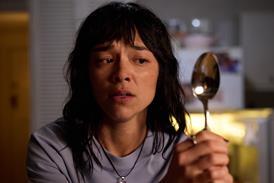Dir: Jose Alvaro Morais. Portugal. 2003. 95mins
Exclusively for followers of Portuguese cinema and dealing with national traumas that do not always translate into dramatic narrative sense, Jose Alvaro Morais' latest effort, Quaresma, while visually impressive, remains pretty much a puzzle for those who will wish to take the plot at face value. Shot in the north of Portugal and on location in Denmark, it attempts to deal with the contemporary crisis of a country on the brink of losing its identity, and of a generation tearing itself away from its soil. However, since many of the proceedings are enigmatic and many of the characters remain unresolved - not to mention under-explored - the picture should look for festival exposure (it screened in Directors' Fortnight at Cannes) and some television, but not much more.
The main character, David (Cary), is a scientist on his way to Denmark, with his wife and daughter, to study wind energy, but first he has to go back to his native village for the funeral of his grandfather. There he meets the family he had practically lost contact with, is drawn back by memories and by the wild charm of the place, and falls under the spell of his cousin's wife, Ana (Batarda). A 'nature girl', Ana is emotionally perturbed, if not disturbed, with spontaneity that is not immediately understandable, and accuses David, for instance, of being too polite and taking no risks. Life in the country has evidently changed very little, they are all one (almost) happy bucolic family, though the script does not really bother to establish relations very accurately.
Reference is made of old traditions dying, but times are changing, and the old orange groves are about to be sold and torn down to make room for new housing quarters. Once the visit - which takes longer than planned - is over, Ana follows David and his wife, Lucia (Durao), to Denmark to stay with them and ostensibly get over an emotional crisis, which she does in a most peculiar fashion.
Garnished with characters who seem to obey only the whims of the director, and a director who evidently cannot be bothered with dramatic plausibility - for he is trying to convey abstract ideas and the situations at hand are only a tool for that purpose - the plot looks manipulated from beginning to end, actors do not seem to be quite sure what is expected of them, scenes are drawn in arbitrarily to represent something else rather than what they are. It is the only way to explain, for instance, a scene in which the hero's mother has to be in her underwear, behind a wall, while she is enticing her son to remain in the parental home. The only safe way, it seems, is to accept the entire story as a metaphor for a people still struggling with its own history and national identity, fascinated by its roots and longing for them but at the same time tempted to break through to a different, less wild, better organised and more placid existence.
Meticulously framed and artistically lit, to the point where the stills could hang in a photo exhibition, Morais' film looks like a handsome object indeed, but it exists only in a world of its own, not particularly concerned or interested in communicating with our world.
Prod cos: Mandragoa Films, Gemini Films, RTP Radiotelvisao Portuguesa, Icam
Int'l sales: Gemini Films
Prod: Paulo Branco
Scr: Jeanne Waltz, Morais
Cinematography: Acacio de Almeida
Ed: Christine Maffre
Prod des: Isabel Branco
Music: Bernardo Sasseti
Main cast: Beatriz Batarda, Filipe Cary, Rita Durao, Paula Guedes, Teresa Madruga, Fernando Heitor, Rita Loureiro, Nuno Lopes, Candido Ferreira, Pietro Romani

















No comments yet